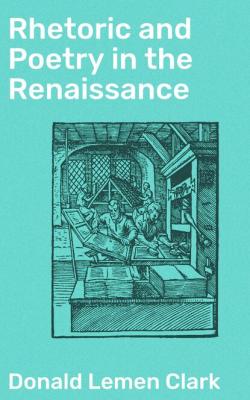Rhetoric and Poetry in the Renaissance. Donald Lemen Clark
Читать онлайн.| Название | Rhetoric and Poetry in the Renaissance |
|---|---|
| Автор произведения | Donald Lemen Clark |
| Жанр | Документальная литература |
| Серия | |
| Издательство | Документальная литература |
| Год выпуска | 0 |
| isbn | 4064066245085 |
Donald Lemen Clark
Rhetoric and Poetry in the Renaissance
A Study of Rhetorical Terms in English Renaissance Literary Criticism
Published by Good Press, 2019
EAN 4064066245085
Table of Contents
Part One The General Theory of Rhetoric and of Poetry
Chapter III Classical Rhetoric
Chapter IV Classical Blending of Rhetoric and Poetic
Chapter VI Logic and Rhetoric in the English Renaissance
Chapter VII Renaissance Poetic
Chapter VIII Theories of Poetry in the English Renaissance
Part Two The Purpose of Poetry
Chapter I The Classical Conception of the Purpose of Poetry
Chapter II Mediaeval Ideas of the Purpose of Poetry
Chapter III Rhetorical Elements in Italian Renaissance Conceptions of the Purpose of Poetry
Chapter IV English Renaissance Ideas of the Purpose of Poetry
Preface
In this essay I undertake to trace the influence of classical rhetoric on the criticisms of poetry published in England between 1553 and 1641. This influence is most readily recognized in the use by English renaissance writers on literary criticism of the terminology of classical rhetoric. But the rhetorical terminology in most cases carried with it rhetorical thinking, traces of whose influence persist in criticism of poetry to the present day.
The essay is divided into two parts. Part First treats of the influence of rhetoric on the general theory of poetry within the period, and Part Second of its influence on the renaissance formulation of the purpose of poetry. This division is called for not by the logic of the material, but by history and convenience. A third phase of the influence of rhetorical terminology I have already touched on in an article on The Requirements of a Poet[1], where I have shown that historically the renaissance ideal of the nature and education of a poet is in part derived from classical rhetoric.
No writer today, who would treat of the criticism of the renaissance, can escape his deep indebtedness to Dr. Joel Elias Spingarn, whose Literary Criticism in the Renaissance has so carefully traced the debt of English criticism to the Italians. In going over the ground surveyed by him and by many other scholars I have been able to add but slight gleanings of my own. In this field it is my privilege only to review and to supplement what has already been discovered. But whereas others have called attention to the classical and Italian sources for English critical ideas, I am able to show that in addition to these sources, the English critics were profoundly influenced by English mediaeval traditions. That these mediaeval traditions derived ultimately from post-classical rhetoric and that they were for the most part later discarded as less enlightened and less sound than the critical ideas of the Italian Aristotelians does not lessen their importance in the history of English literary criticism.
In so far as the text of quoted classical writers is readily accessible in modern editions, I offer my readers only an English translation. For quotations difficult of access I add the Latin in a footnote. In the case of those English critics whose writings are incorporated in the Elizabethan Critical Essays edited by Mr. Gregory Smith, or in the Critical Essays of the Seventeenth Century, edited by Dr. J.E. Spingarn, I have made my citations to those collections in the belief that such a practice would add to the convenience of the reader.
The greatest pleasure that I derive from this writing is that of acknowledging my obligations to my friends and colleagues at Columbia University who have so generously assisted me. Professor G.P. Krapp aided me by his valuable suggestions before and after writing and generously allowed me to use several summaries which he had made of early English rhetorical treatises. Professor J.B. Fletcher helped me by his friendly and penetrating criticism of the manuscript. I am further indebted to Professor La Rue Van Hook, Dr. Mark Van Doren, Dr. S.L. Wolff, Mr. Raymond M. Weaver, and Dr. H.E. Mantz for various assistance, and to the Harvard and Columbia University Libraries for their courtesy. My greatest debt is to Professor Charles Sears Baldwin, whose constant inspiration, enlightened scholarship, and friendly encouragement made this book possible.
Part One
The General Theory of Rhetoric and of Poetry
Chapter I
Introductory
By definition the renaissance was primarily a literary and scholarly movement derived from the literature of classical antiquity. Thus the historical, philosophical, pedagogical, and dramatic literatures of the renaissance cannot be accurately understood except in the light of the Greek and Roman authors whose writings inspired them. To this general rule the literary criticism of the renaissance is no exception. The interpretation of the critical terms used by the literary critics of the English renaissance must depend largely on the classical tradition. This tradition, as the labors of many scholars, especially Spingarn, have shown, reached England both directly through the publication of classical writings and to an even greater degree indirectly through the commentaries and original treatises of Italian scholars.
The indebtedness to the Italian critics is well known and has been widely discussed. Although the present study does not hope to add to what is known of the influence exerted on the literary criticism of the English renaissance by the Italians, it does propose to show the English critics to have
